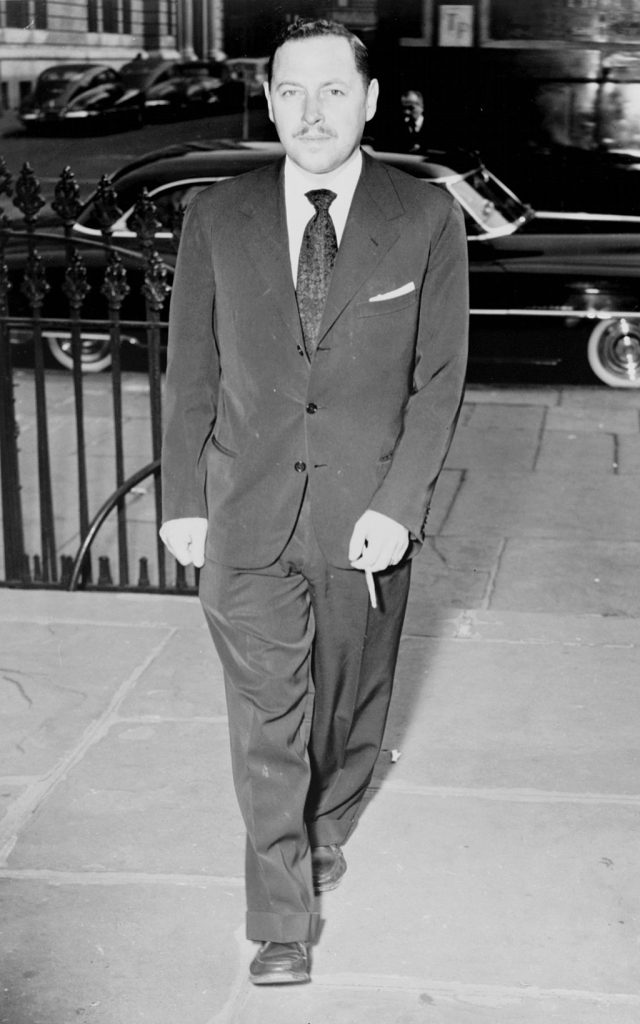87 Tennessee Williams (1911 – 1983)
Amy Berke; Robert Bleil; Jordan Cofer; and Doug Davis

Born Thomas Lanier Williams III in Mississippi, Williams later adopted the pen name “Tennessee” after he began his writing career. Williams’s early life was fraught with family dysfunction. Williams’s father was a shoe salesman who struggled with alcoholism and at times exhibited violent tendencies. Williams’s mother, Edwina, covered for her husband’s often embarrassing behavior, attempting to maintain a veneer of Southern gentility. Williams and his two siblings, Dakin and Rose, weathered the family dynamics for a time, until Rose was diagnosed with schizophrenia. After years of treatment proved inadequate, Williams’s mother eventually approved a lobotomy for Rose, and after the procedure, the young woman was never the same, spending the rest of her life in an institution. Williams, who was very close to Rose, was tormented about his sister, and many of his plays dealt in some way with the trauma Rose endured. Williams attended college for a time as he developed his writing skills, attempting to garner attention for his work. It was not until the 1940s that Williams enjoyed his first success with The Glass Menagerie, which opened in Chicago and eventually made its way to New York and enjoyed a long run on Broadway. Williams followed that success in 1947 with A Streetcar Named Desire, one of his most enduring plays. Throughout the 1940s and 1950s, Williams enjoyed a string of successes and saw a number of his plays adapted for film. By 1959, he had won multiple Pulitzer prizes for his work. In the 1930s, Williams had accepted his sexual orientation as a gay man but maintained a private life. In later years, Williams struggled with alcoholism and prescription drug addiction. After the painful loss of his partner of fourteen years, Frank Merlo, Williams faced serious depression, and over the last twenty years of his life, Williams struggled to reignite his writing career while his health and mental state deteriorated. In February 1983, Williams was found dead in a hotel room in New York after apparently choking on a bottle cap.
Tennessee Williams’s style is often referred to as poetic realism or poetic expressionism. Expressionism is a part of the modernist movement in art and literature, where the expression of emotion or emotional experience takes precedence over the materialistic depiction of physical reality. Williams’s plays typically contain stage directions that call not for a physical setting but for a creation of mood. Physical setting is often altered, augmented, or distorted in order to create a mood or to suggest an emotion. Music, lighting, and screen legends are used symbolically to create this kind of effect. In terms of characterization, Williams’s plays often center on misfits or outcasts outsiders who are often very sensitive and completely out of tune with contemporary times. Characters may be at odds with restrictive Southern mores, and they may struggle with sexual repression. In A Streetcar Named Desire, Blanche DuBois is a complicated character who at times performs the role of Southern Belle, slightly down on her luck but steeped in Southern gentility with fine manners. At other times, the mask slips, and we see Blanche the sexually hungry woman, who gives a predatory stare at the young newspaper boy. At still other times, we see Blanche in all of her raw vulnerability, terrified of being “played out,” of having lost her youth and looks, of being utterly alone.
“A Streetcar Named Desire”

Or try the link below to access this selection and read Scenes 1-4, pp. 1- 75:

